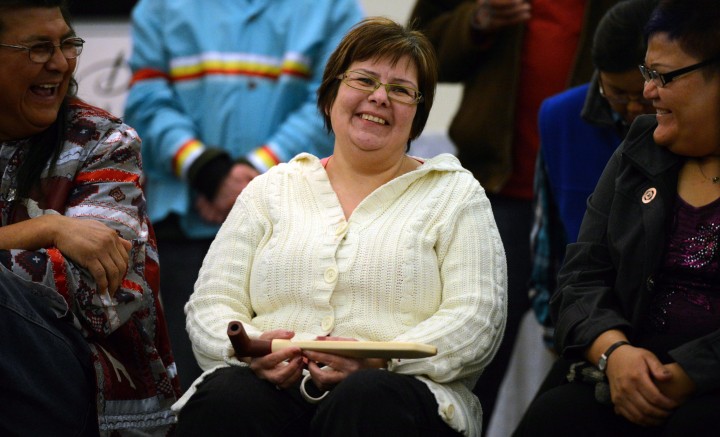Although she publicly rebuffed the former aboriginal affairs minister’s attempts to meet with her, Theresa Spence is taking a more hopeful tone when it comes to First Nations relations with Ottawa.

The Attawapiskat chief said it’s a good first step that newly-named Aboriginal Affairs Minister Bernard Valcourt met with elder Raymond Robinson last week, before he ended his five-day hunger strike on Tuesday.
“That’s a first step, for (Valcourt) to show that he wants to know what’s going on,” said Spence, when reached in Attawapiskat, Ont.
“It’s good to see that there’s a concern and to respect Raymond to have a meeting with him. It demonstrates that he is listening, and I wish the prime minister would do the same.”
She added she hoped Valcourt will be there for the First Nations leaders, “to have a true partnership instead of a control mechanism. “
Spence, who famously embarked on what she initially called a hunger strike for 44 days last winter at the height of aboriginal protest movement Idle No More, now likens her liquids-only diet to a spiritual fast.
“I know you guys see it as a hunger strike, but for me it was like fasting, it was our ways of praying and that’s the way we pray, is fasting,” she said.
- ‘Shock and disbelief’ after Manitoba school trustee’s Indigenous comments
- Canadian man dies during Texas Ironman event. His widow wants answers as to why
- Several baby products have been recalled by Health Canada. Here’s the list
- ‘Sciatica was gone’: hospital performs robot-assisted spinal surgery in Canadian first
At the time, she refused to meet with former minister John Duncan, who has since resigned. Spence demanded a meeting between First Nations leaders, Prime Minister Stephen Harper and Governor General David Johnston.
She said she is still working with aboriginal leadership to follow up on a Jan. 11 meeting between First Nations and Harper – a meeting Spence did not attend. She is also planning to write to Ontario Premier Kathleen Wynne to ask for a meeting alongside the federal government.
But it appears Spence’s days as a would-be hunger striker are over. When asked if she would embark on a similar protest again, she said: “That’s a very odd question for me to answer.”
“I had a message from the women chiefs and the message that they gave me was that I did my part as a woman, and I raised my voice, and it’s time for the leaders to take over and do their part,” she said.
“Not just the First Nations leaders but the prime minister and the other governments to do their part.”


Comments